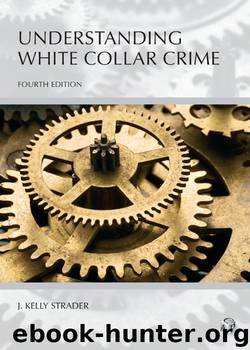Understanding White Collar Crime, Fourth Edition by Strader J. Kelly

Author:Strader, J. Kelly [Strader, J. Kelly]
Language: eng
Format: epub
Publisher: Carolina Academic Press
Published: 2017-02-28T16:00:00+00:00
§12.06 Vicarious Liability
[A] Aiding and Abetting
A defendant may be found guilty of perjury by aiding and abetting another person's perjury. In one case, for example, the defendant had prepared a false document for an unknowing witness to use at trial. 76 The defendant was charged under the federal aiding and abetting statute 77 as a principal in the commission of perjury under §1623.
On appeal, the Eleventh Circuit affirmed the conviction. The court found that an individual who intentionally causes an innocent person to commit perjury may be indicted as a principal for the commission of perjury; proof of aiding and abetting is sufficient for conviction. The court found that the defendant's intent that a witness give a false statement under oath, combined with the witness's taking of the oath, suffices for perjury. 78 Thus, the defendant could be convicted of perjury even if the defendant had never personally been placed under oath.
[B] Subornation of Perjury
Under §1622 of the federal criminal code, a defendant may be convicted of “suborning” another person to commit perjury. 79 To prove guilt, the government must show both that the defendant knowingly persuaded another person to lie under oath, and that that person actually committed perjury under either §1621 or §1623. 80
Strictly speaking, the crime of subornation does not provide for vicarious liability—it does not impose liability for an act committed by another. Rather, the statute directly punishes one who causes another to commit perjury. Subornation is similar to vicarious liability, however, because the defendant cannot be convicted unless another person has actually committed the object crime.
(1) having taken an oath before a competent tribunal, officer, or person, in any case in which a law of the United States authorizes an oath to be administered, that he will testify, declare, depose, or certify truly, or that any written testimony, declaration, deposition, or certificate by him subscribed, is true, willfully and contrary to such oath states or subscribes any material matter which he does not believe to be true; or
(2) in any declaration, certificate, verification, or statement under penalty of perjury as permitted under section 1746 of title 28, United States Code, willfully subscribes as true any material matter which he does not believe to be true; is guilty of perjury and shall, except as otherwise expressly provided by law, be fined under this title or imprisoned not more than five years, or both.
Whoever under oath (or in any declaration, certificate, verification, or statement under penalty of perjury as permitted under section 1746 of title 28, United States Code) in any proceeding before or ancillary to any court or grand jury of the United States knowingly makes any false material declaration or makes or uses any other information, including any book, paper, document, record, recording, or other material, knowing the same to contain any false material declaration, shall be fined under this title or imprisoned not more than five years, or both.
An indictment or information for violation of this section alleging that, in any proceedings before or
Download
This site does not store any files on its server. We only index and link to content provided by other sites. Please contact the content providers to delete copyright contents if any and email us, we'll remove relevant links or contents immediately.
The Borden Murders by Sarah Miller(4302)
The Secret Barrister by The Secret Barrister(3688)
Police Exams Prep 2018-2019 by Kaplan Test Prep(2540)
Coroner's Journal by Louis Cataldie(2467)
The Splendid and the Vile by Erik Larson(2455)
Terrorist Cop by Mordecai Dzikansky & ROBERT SLATER(2069)
My Dark Places by James Ellroy(1922)
A Colony in a Nation by Chris Hayes(1922)
The Art of Flight by unknow(1866)
Black Klansman by Ron Stallworth(1788)
Objection! by Nancy Grace(1778)
A Life of Crime by Harry Ognall(1719)
The New Jim Crow by Michelle Alexander(1687)
Anatomy of Injustice by Raymond Bonner(1656)
American Prison by Shane Bauer(1656)
Invisible Women by Caroline Criado Perez;(1628)
Whoever Fights Monsters by Robert K. Ressler(1612)
Obsession (The Volkov Mafia Series Book 1) by S.E Foster(1565)
A is for Arsenic: The Poisons of Agatha Christie (Bloomsbury Sigma) by Kathryn Harkup(1535)
